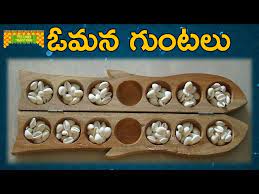Vamanagunta : An Old Traditional Game Played At Home With Joy
Vamanagunta : Also known as Vanaguntalu, Onagandlu, or Baddilata, is an old traditional game that can be played while sitting at home. The game involves a fish-shaped stick made of marabandhu wood, which has two plates that can be opened and closed. Each plate has seven holes, making a total of fourteen holes for both plates. The holes are filled with tamarind or soap nut seeds.
To start the game, all the seeds in a hole are taken and emptied. The players then distribute the seeds, starting from the hole to the right of the emptied hole, and continue distributing one seed in each hole in succession. When all the seeds in hand are distributed, the players take seeds from the next hole and continue distributing them. The distribution continues until all the seeds in hand are used up, and there is an empty hole that cannot be distributed.
If the empty hole becomes neutral, meaning it is not followed by another empty hole, then all the seeds in the holes after that empty hole will be won by the person who distributed them. These seeds are taken from the hole and kept aside. If the empty hole is followed by another empty hole, the match is over, but no seeds are won.
Vamanagunta Playing Process
After that, the next player gets a chance to distribute the seeds, starting with the holes on their side. In the later stages of the game, a player cannot distribute if all the holes in their half are empty. The opportunity to distribute should be given back to the other person respectively.
It is not allowed to cross a hole while distributing or distributing in the opposite direction. One person distributes while the other person carefully watches. The game continues in this manner until all the holes in the board are empty. In the end, the number of seeds won by each player is counted, and the player with the highest number of seeds is declared the winner.
There are additional rules or variations that can be incorporated into the game, such as the concept of “aavu” when four seeds fall in a hole or the use of a sock as a house for seeds. Another variation is the “thief and policeman” game, where a player takes all the seeds from one hole and puts them in the next hole, and if an empty hole is encountered, the player can knock and take all the seeds in the next hole.
These traditional games provide entertainment and engagement for players, and they have been enjoyed for many generations.
Attakodalla Aata and Donga Police Aata are traditional games played in various regions of India, particularly in the states of Andhra Pradesh and Telangana. These games are typically played by children and are a part of their cultural and recreational activities.
Attakodalla Aata, also known as “House-House” or “Four Houses,” is a game where players start from a designated spot (such as a sock) and move around a board or pattern. If the designated spot is empty and a player has a seed in their hand, they place the seed on top of the spot, which becomes their “house.” Any seeds that fall into their house belong to them, and other players are not allowed to put seeds in them. The objective is to collect as many seeds as possible in one’s house.
Donga Police Aata, also known as “Thief and Police,” is a chase and strategy game. One player represents the thief, and another player represents the police. The thief’s goal is to escape or avoid being caught by the police, while the police try to catch the thief. The game typically involves movement and decision-making within a defined playing area or pattern.
Both Attakodalla Aata and Donga Police Aata are played in informal settings, such as on the ground using drawn patterns or boards, and the rules may vary slightly depending on the region or individual preferences. These games have been passed down through generations and continue to be enjoyed as part of traditional Indian culture.
Also Read : Chemmachekka : Charadesi mogga A Traditional Game Played By Girls

